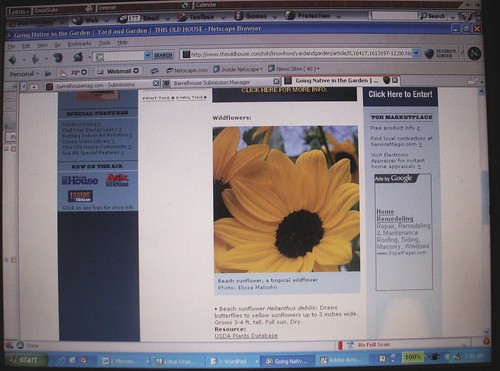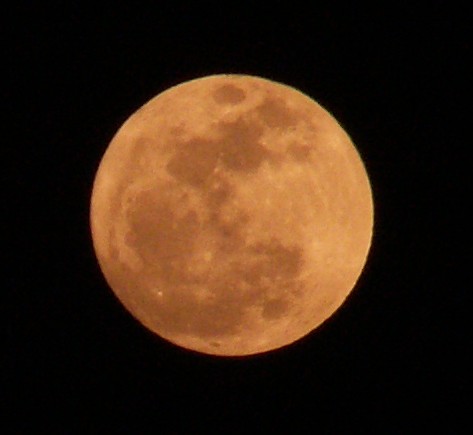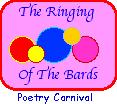Live at "This Old House"/Fire Moon/Dancin' Fool

Large view
Thanks to This Old House for using my photo of beach sunflowers in its article, "Going Native in the Garden." The photo appears on the last page of the article, from which I've taken this screen shot.
TOH contacted me after noticing the shot I'd originally posted here. Flickr has been a wonderful site for giving my photos exposure (pun intended).
We've been smelling smoke around here lately, off and on, most likely due to the Georgia wildfires. The haze probably also colored tonight's moon.
I took the shot below at 8:18 PM (EST) on May 1, about 10 hours before Full Moon. This is the Full Flower Moon, according to the Old Farmer's Almanac -- also called the Full Corn Planting Moon and the Full Milk Moon.
Mary, however, calls this the Fire Moon. I used a 1/30-second exposure at f/6.3 and took this shot 35 minutes after moonrise. By the time I finished my grocery shopping it had lost its color.

Except for cropping, I've done no adjustment on this shot. The extensive blaze in Georgia (which as of last night had consumed 125 square miles) has sent smoke down this far into central Florida. I didn't smell it when I took this shot, but I smelled it when Mary and I took our walk early this morning, at the time of these Moon photos, when the Moon was much closer to zenith.
According to this article, health alerts have been issued as far south as Orlando, which is southeast of us.
On Sunday night, I found the closest thing yet in my community to the unbridled joy I'd experienced at Dance Freedom back in Cambridge....
When Mary and I first moved here from Boston in 2003, I got involved almost immediately with our local creative communities. That involvement was instrumental to my adjustment to life in central Florida. Without it, getting over my homesickness for the adopted city I'd left behind would have taken much longer. Coupled with this area's stunning natural resources, I soon found that almost everything I loved about Boston had its counterpart here, with a couple of notable exceptions.
One is a good public transportation network, which I don't expect to see here any time soon. Free-dance was another. I'd been to dances here, but they weren't the same.
Until Sunday night.
The same folks who host the Woodview Coffeehouse open mic held a "Spring Fling" evening of dinner and dance, with live performers and music selections dating across several decades. Although the format differed from Dance Freedom's, the energies at the Spring Fling were equally free-spirited. As one person commented, this was just about the wildest non-alcoholic party she'd ever seen.
I got one heckuva workout, which gave me the chance to meet good folks, including neighbors. People whom I already knew hadn't seen me in this context before. ("I thought you were just a writer," one quipped.)
I hadn't started dancing -- truly dancing -- until I moved to Massachusetts. Before then, I had visualized characters dancing in my head, but had been too afraid to actually move, myself. I'd been taught how to waltz in time for my Sweet 16, but that had been someone else's idea of how I ought to move. It hadn't helped that my first instinct was to lead.
I want to see the simulation again. The model was exquisite, they all are or they wouldn't be in the catalogues. But I want this Sportsmaster. I want to see what I could do if I could walk, but I think I want it for a much greater reason than that. I am tingling all over. There is someone in me who is struggling to get out, and I think the Sportsmaster can free her.
"Choreographer" was the first short story I wrote after my move to Massachusetts in 1983. That year it won the New England Science Fiction Association's Short Story Prize at Boskone. It went on to be published in The River Reader in 1985 and won the River Reader Prize for Fiction.
Its protagonist, Rina, is a quadraplegic who finds a way to dance by creating her virtual counterpart with the help of a body graphics simulator. In doing so she risks everything, including Rodney, the monkey trained to be her physical assistant.
I told them: yes, I am a quadraplegic. No, I am not on public assistance. Yes, it was my choice. Yes, I refused a ServoNurse and now I want a simulator. No, I am not mentally incapacitated. Yes, I have collateral.
I was being very careful. I am scared.
Finally, one bank of reputable stature agreed to loan me the money for a Sportsmaster. Long-term payback, as generous as they can be with someone in my position. I am sure I want this, and I am not sure. My teeth still have muscles for gritting, and I gritted them, and gave my name, identification numbers and my one remaining account that goes for food and shelter. My collateral was sitting in my lap and twirling my hair in his fingers. I looked down at him with tears in my eyes. I wondered if I am indeed of sound mind.
"Choreographer" grew out of my own need to dance and my own emotional paralysis. The characters in my childhood fantasies took many of their cues from the ice skating I watched on TV as a kid, only my visualizations took those movements further. My fantasy people had supernatural powers. When they danced, they violated the laws of physics with impunity.
Back in the early 70s, the real-world ice skater whose strength and power most stunned me was the Russian pairs skater Irina Rodnina. Hence the character names "Rina" and "Rodney" in my story.
I felt my ribcage moving in my chair, my neck making small circles as the Rina on the screen danced before me. I felt a touch of envy. But I have recreated myself; she comes to me as a guide. She is the woman I want to be, and she is the woman I already am. Sometimes this becomes confusing.
Before I was able to move freely, myself, I often felt my own muscles responding to dance music. I already knew how I wanted to move. I had watched my fantasy people dance that way for years, unself-consciously and unfettered. I could accept "their" sensuality, but was still terrified of my own.
I chose music that is more grandiose, with swells that filled the living room with vibrations. And in doing so, I felt myself changing, as though a strange power filled the space behind my eyes. As though the pressure there was driving tears out of me, to make room for something else.
The Rina on the screen is more aggressive now, more feral. She and I are partners, and as I recreate her she reintroduces me to myself. Together, we can move as no other human being moves ... and yet, we are very, very human. My frailty lies in my dead limbs. Her frailty lies in the fact that she is a picture.
I was renting a small house in Woburn at the time. Of its six rooms, its kitchen was by far the largest, providing me with a sizeable linoleum "dance floor." I set up a mirror, slipped Thomas Dolby's The Golden Age of Wireless into my cassette tape player, and started freeing my body with the help of, "She Blinded Me With Science." Timidly at first, with a little swaying from side to side. I forget how long it took before I could lift my feet off the floor.
Burning a candle at both ends, I put up the Sportsmaster as collateral. I felt as though my eyes were made of fire.
Then I went to my telecatalogue and ordered the most advanced music synthesizer I could get. Full orchestra. Full range of sound effects. Instant interface with the Sportsmaster.
When my errands were done, I asked Rodney to bathe me in the most heavily scented perfumed lotions and soaps I owned. I told him to move slowly and lightly, so that I could get to know myself wherever I still had feeling. More than ever I wished there was someone here to hold and hug me. More than ever I wished I could hug myself.
The character Rina submits her dances -- her virtual self -- to a public access channel. (Writing in 1983, I had no concept of the Internet.) Her viewers believe the simulation is real.
After dinner, we sat by the television and watched the dream-Rina. And so did some million-odd other people. There was something about the way she moved that fascinated them.
After that, I received a call from the public access people. They wanted me to do more. They asked me if I will take a live spot and I gracefully declined. They jokingly asked me if I was another Garbo and I jokingly said no.
Eventually Rina recaps her expenses and begins to create a virtual troupe of dancers. The income from her art opens up the possibility that she might one day be able to pay for treatments in muscle and nerve regeneration.
One of us is trembling, and I can't figure out which one. I tell [Rodney], in soft, loving tones, that it is not proper for collateral to shiver; in reply, he hops off me to go turn on the music. My first appointment is for the day after tomorrow. I lean in toward the Sportsmaster with my stylus in my mouth, and get back to work. Some day, very soon, I am going to dance.
The catharsis of writing "Choreographer" did for me what its fictional Sportsmaster did for Rina. Not long after I had finished drafting the story, I went to a block party hosted by the Grolier Poetry Bookshop off Harvard Square. Feeling vulnerable, I fought through my fear and finally liberated my internal dancer from her dungeon.
Since that time I've been asked more than once, including Sunday night, if I danced professionally.
Professionally? Nope. Free-spiritedly? Yep.
Freed-spiritedly.
About 90 people attended the Spring Fling, and there's talk of holding more dances like it. Count me in.











0 Comments:
Post a Comment
<< Home